The Technology Arena: Maintaining the Regional Qualitative Edge
Liran Antebi
Trends
Israeli technological superiority is not free of weakness · Operation Guardian of the Walls demonstrated use of AI · Israel also leads in civilian technology fields · Many unicorns with positive economic and international influence
The Technology Arena: Maintaining the Regional Qualitative Edge
Liran Antebi
Recommendations
Maintain technological-military superiority · Improve the air defense system as per changing threats · Launch governmental activity to formulate and implement a national strategy on AI
Israel’s military technological superiority was demonstrated in Operation Guardian of the Walls, highlighted by air defense systems, artificial intelligence applications, and precision strike capabilities. In addition, despite the effects of the COVID-19 pandemic, Israel has maintained its economic strength, particularly thanks to the success of technology companies that issued public offerings or were sold for major sums. However, Israel also has weaknesses in the technology realm. For example, it is evident that the aerial threat is changing due to new advanced offensive and defensive technologies. In addition, Israel suffered from successful cyberattacks against civilian companies and from the negative publicity and diplomatic fallout of controversial activity by Israeli companies in the offensive cyber domain. Israel is not sufficiently prepared for emerging digital threats such as “deep fake” and “fake news” attacks; it lacks a national strategy and orderly management for leadership in fields marked by an international struggle for superiority, such as artificial intelligence. These weaknesses must be addressed due to the importance of technology leadership for Israel, both in terms of the military and in terms of the economy and international influence.
Technology is of decisive importance to Israeli security, ever since the days when Israel’s first prime minister, David Ben-Gurion, shaped the foundations of the country’s security concept. Today technology affects all areas of life, beyond security and military issues; moreover, it impacts on security through economic, social, and international issues, given that Israel’s economy and military strength rely considerably on its technological edge and technological leadership.
Israel is influenced by the “competition for superiority” underway in the past decade among great powers and countries regarding leadership in technological fields, including artificial intelligence, quantum computing, cyber, robotics, and space technologies. This competition affects the global balance of power, countries’ standing, and their ability to operate in the international arena. Israel is affected by this competition both in “hard” military aspects such as military force buildup, abilities to apply its force on the battlefield, and its ability to fight against terrorism; and in “soft” aspects such as the export of civilian and military technologies that affect the economy, jobs in the economy, and the ability to employ soft power in the international arena.
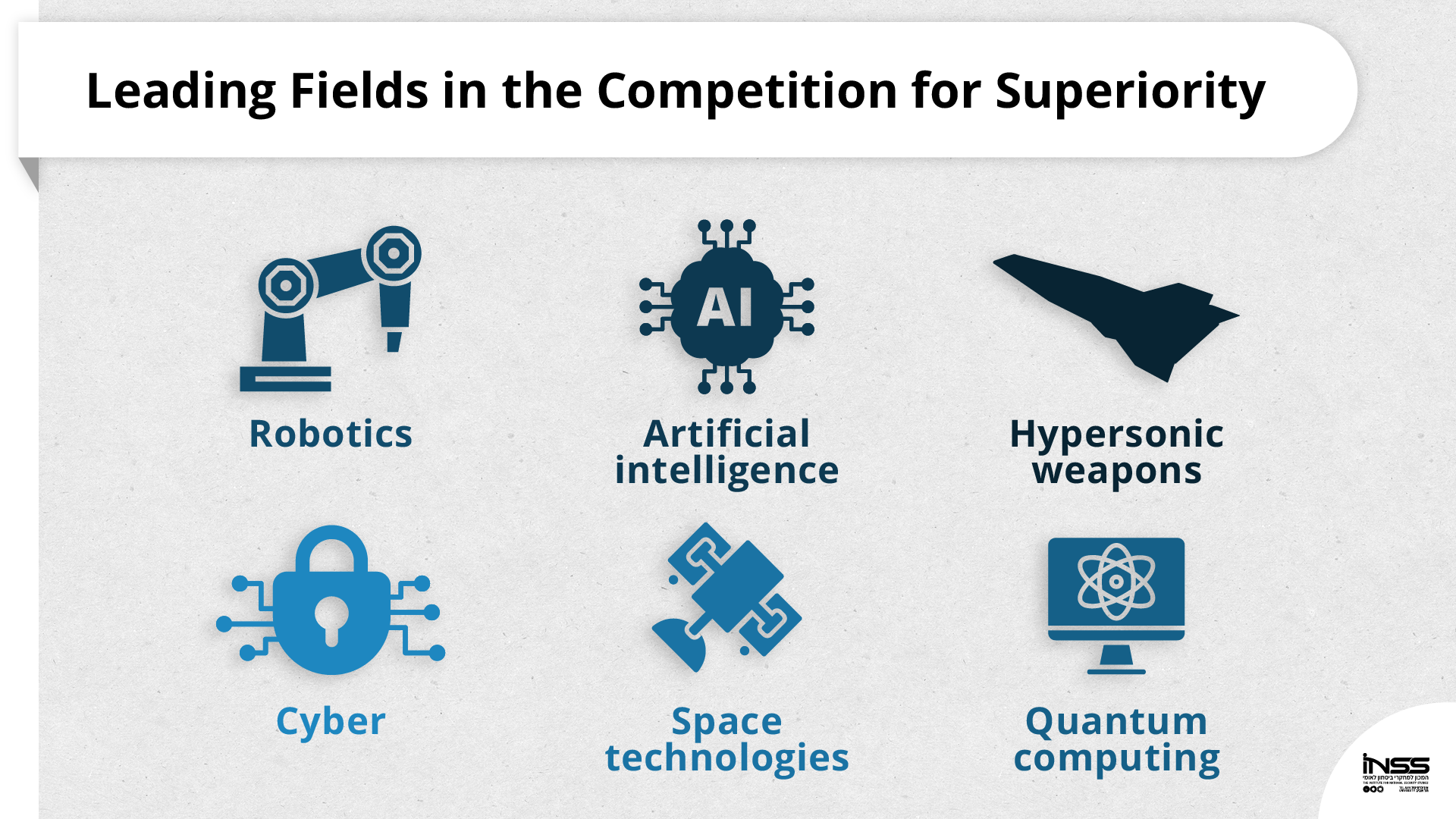
In May 2021, Israel demonstrated its military technological superiority in battle, as part of Operation Guardian of the Walls in Gaza, using advanced technologies, led by artificial intelligence. At the same time it is threatened by advanced technologies, some of them off-the-shelf technologies that have reached the hands of state and non-state enemies, including UAVs (unmanned aerial vehicles) whose use in the Middle East has escalated in the past year.
This chapter examines local and global technological changes of the past year that impact on Israel’s security, and points to the technological issues and areas in which Israel has scored significant achievements, as well as those requiring preparations or improvement at the outset of 2022.
Current Trends
Israel has traditionally been a global military technology leader in fields such as air defense systems, UAVs, cyber, and artificial intelligence. In addition, in the past year Israeli companies have become increasingly dominant in civilian technological fields, including automotive, fintech, and service applications, with many tech companies becoming unicorns – private companies valued at over $1 billion. Below are the current trends affecting Israel in several prominent technological fields.
Technology and Israeli Military Power
In 2021 Israel once again proved that technologically and militarily it is one of the preeminent countries in the Middle East. It surpasses neighbors, adversarial states, and non-state organizations in the fields of advanced defense systems, technological intelligence, advanced airpower, advanced capabilities in defensive and offensive cyber activity, innovation processes in technological naval and ground forces strength (albeit underway at a relatively slow pace), and innovative technologies, including the ability to operate multi-dimensionally and to increase lethality, as defined by Chief of Staff Aviv Kochavi.
In Operation Guardian of the Walls, especially prominent were the increased use of artificial intelligence technologies for the purpose of intelligence and fast and precise strikes on targets, and the advanced use of airpower. The operation highlighted the importance of advanced Israeli air defense technologies, with an emphasis on Iron Dome’s improved capabilities, such as intercepting UAVs. The technological aspect of the operation received extensive coverage in the international media, and Guardian of the Walls was called “the first artificial intelligence war,” with significant emphasis on the use of these technologies in the operation, as well as the pioneering operational use of a “swarm” (group of UAVs) for the purpose of locating and striking ground targets. On the other hand, the fact that the power of the IDF’s ground forces was not demonstrated in the operation was highly noticeable. The value of ground forces maneuver has been questioned since the Second Lebanon War, and it has been argued that this erodes Israeli deterrence; this is also true of ground technologies.
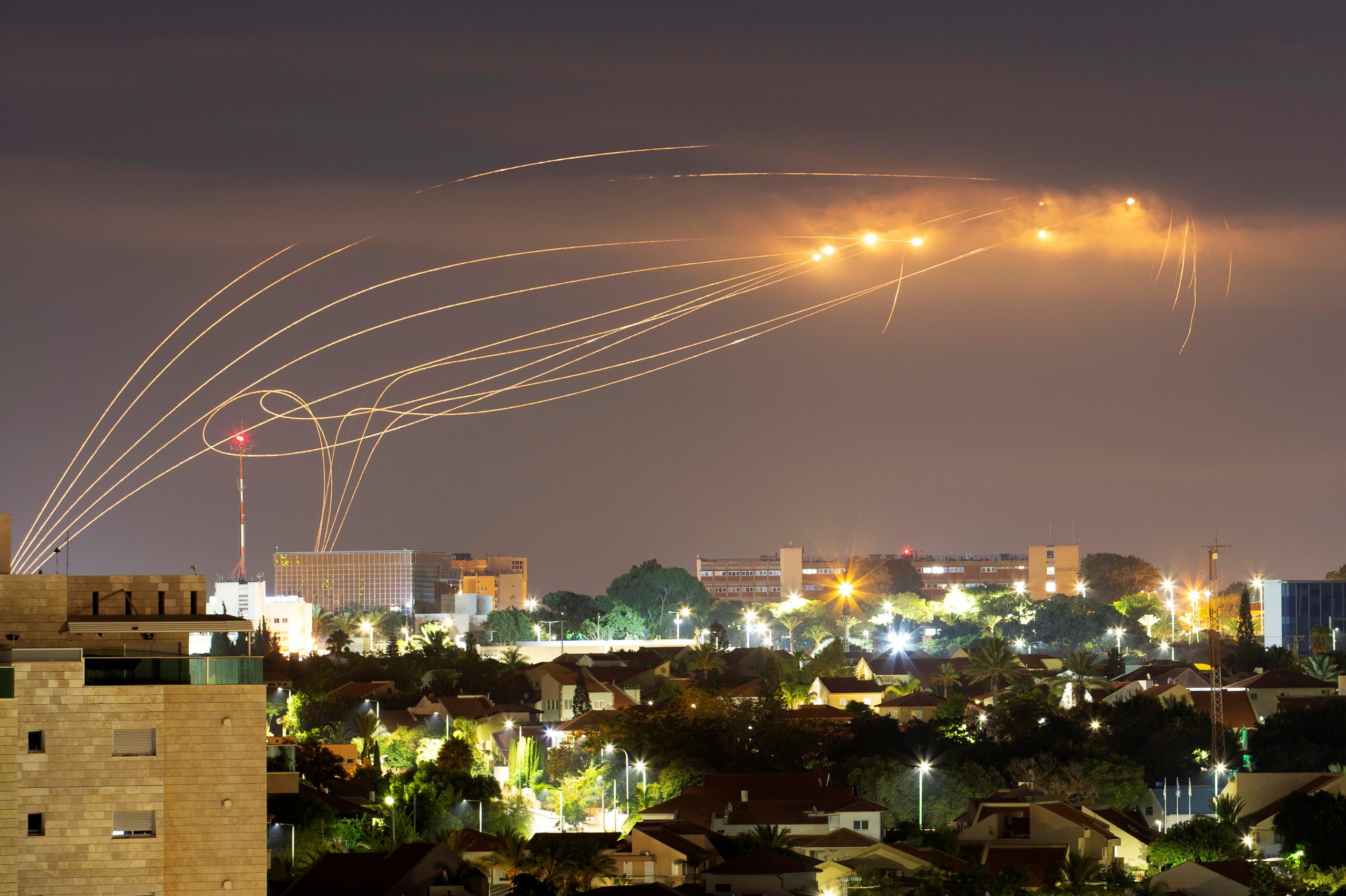
Importance of technology to air defense. Interceptions over Ashkelon during Operation Guardian of the Walls
Photo: REUTERS/Amir Cohen
The Changing Aerial Threat to Israel
The past year saw changes in the aerial threat to Israel. If what stood out in recent years was terrorist organizations’ use of mainly primitive means (e.g., incendiary kites and balloons) and the difficulty of providing a technological solution, in the past year what stood out was the impact of advanced technologies, some of which are off-the-shelf, simple to operate, and inexpensive, which enable various countries and terrorist organizations to operate armed UAVs, for example, or drones for intelligence gathering. These compound the proven threat of statistical attacks via rockets, as well as the threat of precision strikes via Hezbollah’s precision missile project and by means of Iranian-produced explosive UAVs operated throughout the Middle East against various targets.
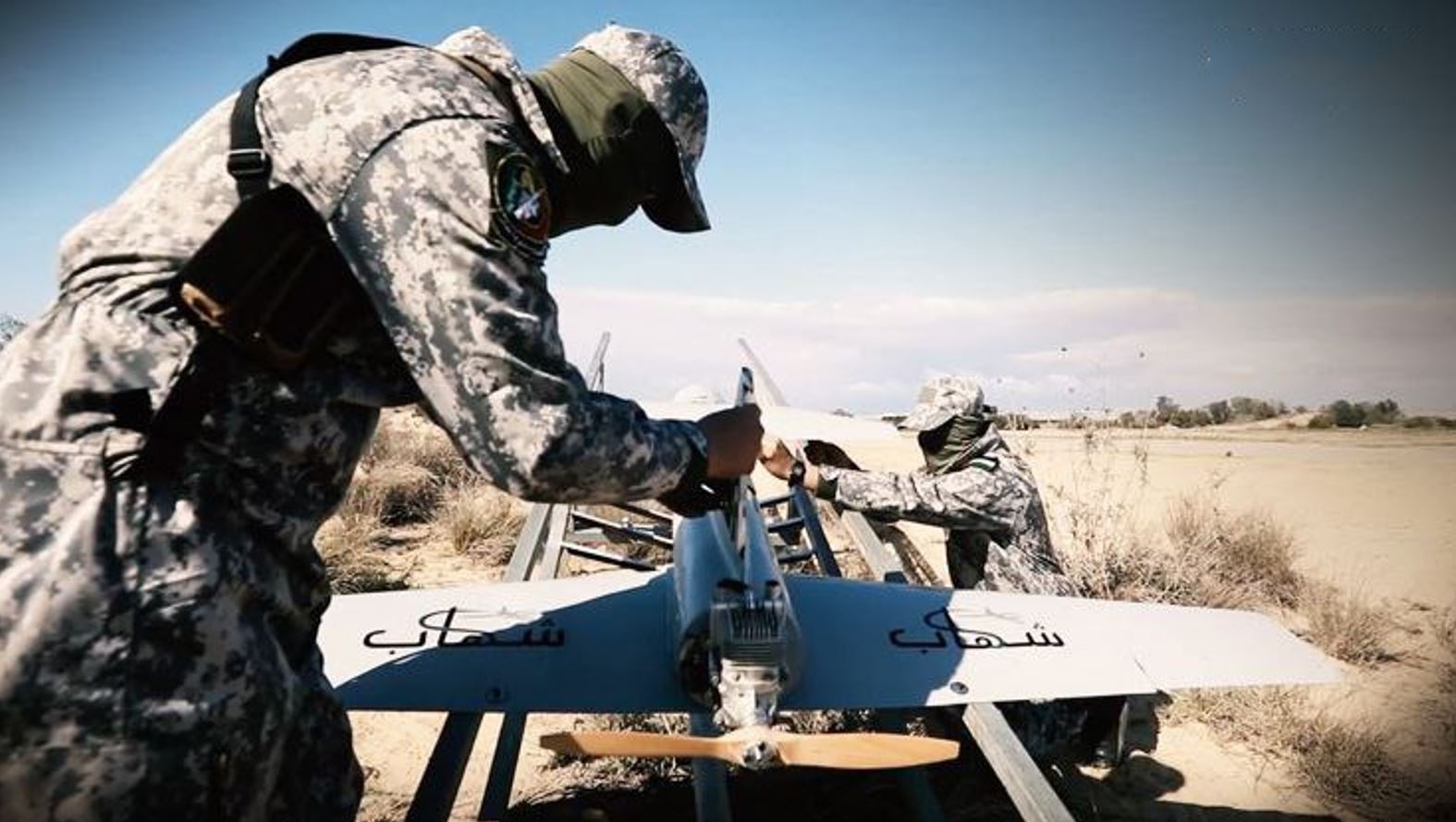
Iranian-made explosive drones throughout the Middle East. Hamas cell during launch of an Iranian-made explosive UAV
Digital Threats and the Cyber Realm as a Continued Growth Engine
During the past year Israel suffered many cyberattacks, mainly against civilian companies that are inadequately protected. A large portion of this technological threat comes from the direction of Iran, which the October 2021 Microsoft Digital Defense Report defines as the only state actor regularly engaging in destructive cyberattacks, including ransomware attacks, most of them against Israeli targets. In addition, Israel is clearly not sufficiently prepared to cope with emerging digital threats, such as deep fake attacks (fakes produced using artificial intelligence) and influence attempts using the dissemination of fake news through bot networks.
On the other hand, Israel is still a world leader in defensive and offensive cyber activity. Alongside the military advantage that this leadership grants, it creates an export field with international influence and a domestic impact on the Israeli economy via 500 cyber companies, with annual sales estimated at $10 billion. Not to its credit, however, the Israeli cyber field stood out in the past year due to the negative exposure of the use of offensive cyber products of the Israeli company NSO by regimes that violate human rights, and against official elements in friendly countries (even including against French President Emmanuel Macron). These exposures embarrassed Israel and forced the Ministry of Defense to reevaluate its policy regarding the supervision of defense exports.
The Impacts of Technology on the Economy and Israel’s International Image
The past year saw positive changes in the Israeli economy, unlike most economies in the world, which have been negatively affected by the COVID-19 pandemic. Aside from the familiar economic indices, Israel demonstrated impressive technological advances, for example in the field of drone deliveries (including via the NAAMA Initiative) and through the activity of companies such as ORCAM, whose product, which helps people with reading difficulties, was selected by TIME magazine as one of the 100 best inventions of 2021.
Israel also continued its transition from “start-up nation” (the country with the most start-up companies per capita) to “scale-up nation” (the country with the most unicorns per capita – private companies whose value is estimated at over $1 billion). Along with the variety of unicorn IPOs that took place this year and venture capital fund investments, there were also private deals totaling $10 billion, with a significant portion of the acquisitions of Israeli companies for the first time carried out by Israeli companies themselves, which emphasizes the strengthening of Israel’s economic-technological power.
In addition, over the past year there were reports of major deals signed for acquisitions from Israeli defense industries, including cooperation agreements with new allies such as the United Arab Emirates, or weapons deals with Morocco. Reports on developments in the realm of space for civilian and military needs, including by companies supported by the Israel Space Agency, also paint Israel in a positive light. At the same time, it is evident that in various civilian and military technological fields such as UAVs and artificial intelligence, Israel’s dominance continued to erode, mainly due to serious competition presented by the great powers and other countries.
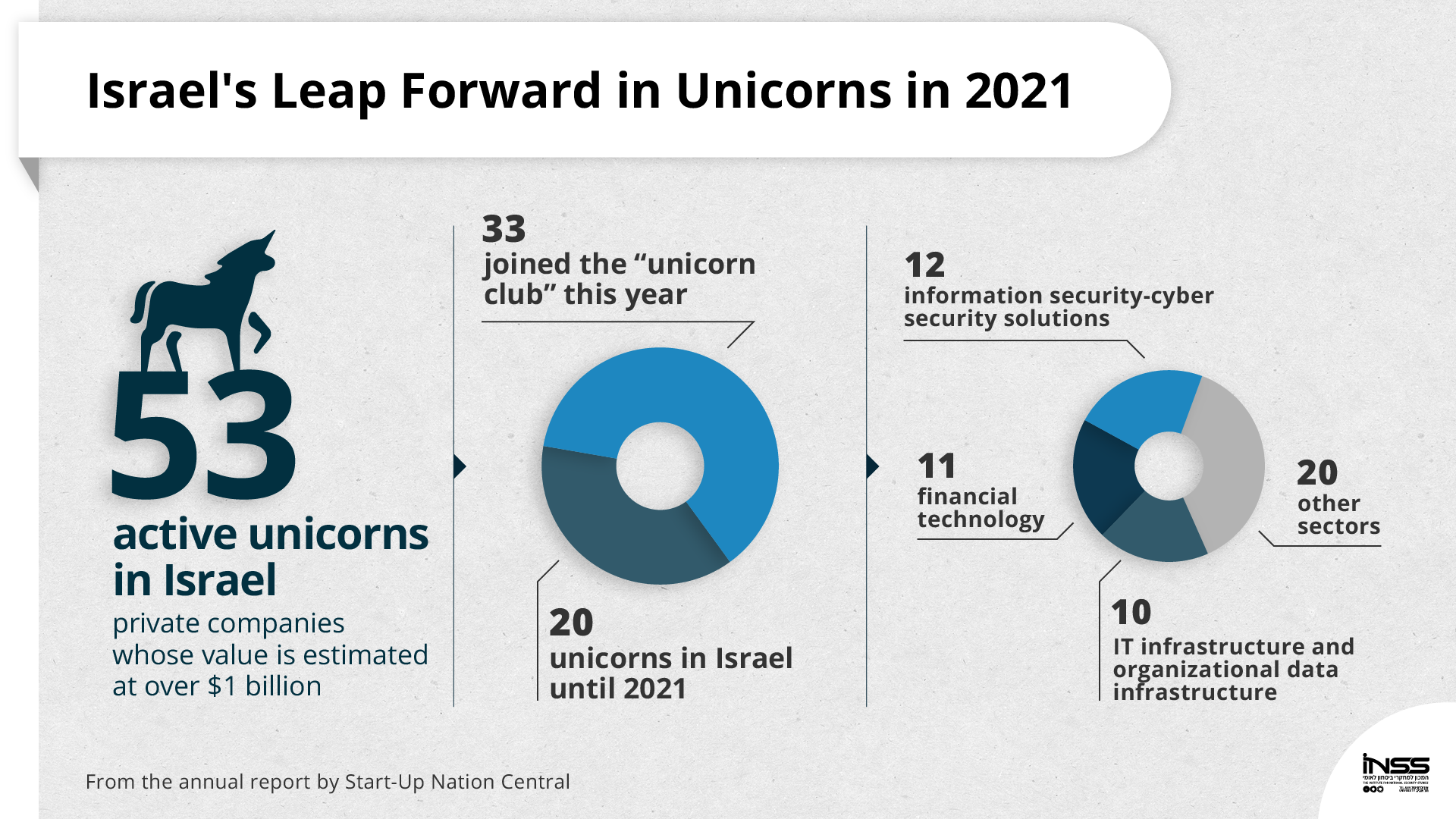
Insights, Forecast, Challenges, and Opportunities
While Israel clearly maintained its technological edge in the past year, there were evident changes in elements that create this strength. Consequently, it is worth considering these changes and adapting Israel’s policy to them, in order not to decline in critical areas, and meanwhile to try to optimize the situation in fields with potential for improvement.
A central field that requires improved preparedness due to technological changes is the evolving aerial threat to Israel. In this context, there is a consistent need to examine big and small threats and the ability to exert airpower, and to adjust the responses as necessary. While the countries bordering Israel lag in terms of independent technological development that poses a real threat, Iran, despite the sanctions and its difficult economic situation, invests in research and development, and in the past year the bulk of its military investment was in the aerial realm. This trend is expected to continue and even to escalate, as there is a concern that Iran will succeed in developing and exporting stealth technologies and “swarms.” These will join the precision technologies with which it seeks to arm Hezbollah.
Consequently, it is imperative to address the fact that Israel’s air defense potential has not been fully realized, including in the fields of defense against various kinds of UAVs (among them, drones) – according to two State Comptroller reports on the issue (2017, 2021). This is in contrast with Israel’s technological and export capabilities in these very fields. Several new systems were revealed in this domain this year; that said, even improving the technological response does not ensure the ability to cope with an attack by means of barrages and saturation – when the enemy simultaneously operates a large quantity of air weapons that challenge the identification and interception systems beyond the level they were challenged in Operation Guardian of the Walls. One of the means discussed is reliance on more artificial intelligence-based identification systems that can also cope with swarms and weapons that do not operate statistically, and with laser-based interception systems that will enable reducing the dependence on interception missiles. Thus, it is recommended that Israel continue to carry out preventive strikes and assume that the defense, as good as it may be, is not hermetic, and to prepare for sustaining attacks and protecting the home front.
A change in government policy is also necessary regarding technologies that are part of the “competition for superiority,” with an emphasis on artificial intelligence and information technologies. The State of Israel is one of the world leaders in developing artificial intelligence. Its standing is reflected in several start-up companies active in Israel in the field and the establishment of development centers of international companies in Israel. Furthermore, Israel is considered a leader in developing and implementing artificial intelligence-based military applications, as demonstrated in Guardian of the Walls. The Israeli edge has been supported for years by a defense industry ecosystem that integrates industry, academia, and military bodies that in concert push the field forward. Inter alia, this edge has been made possible by the unique characteristics of the Israeli defense industry ecosystem related to mandatory service and reserve duty in the army that affect manpower quality and experience and the transfer of knowledge among its various parts, as well as the geographic and cultural proximity and sense of shared destiny that help advance issues and achieve goals quickly and at relatively low prices.
There is a concern that this edge will erode, undermining Israel’s economic strength and its defense and military aspects. This is due to aggressive global competition in all coveted areas of superiority, with many countries managing them in a deliberate and even centralized manner. Israel, however, tends to enable their management by market forces, without government management and sometimes also without sufficient government support. For example, while Israel was ranked six in the Global Artificial Intelligence Index, it is ranked 51 (eleven from the last place place) when it comes to governmental strategy in this field. In this context, it is worth learning from the field of UAVs over the past few years, regarding the negative effects (economic and military) of aggressive global competition in a realm dominated by Israel.
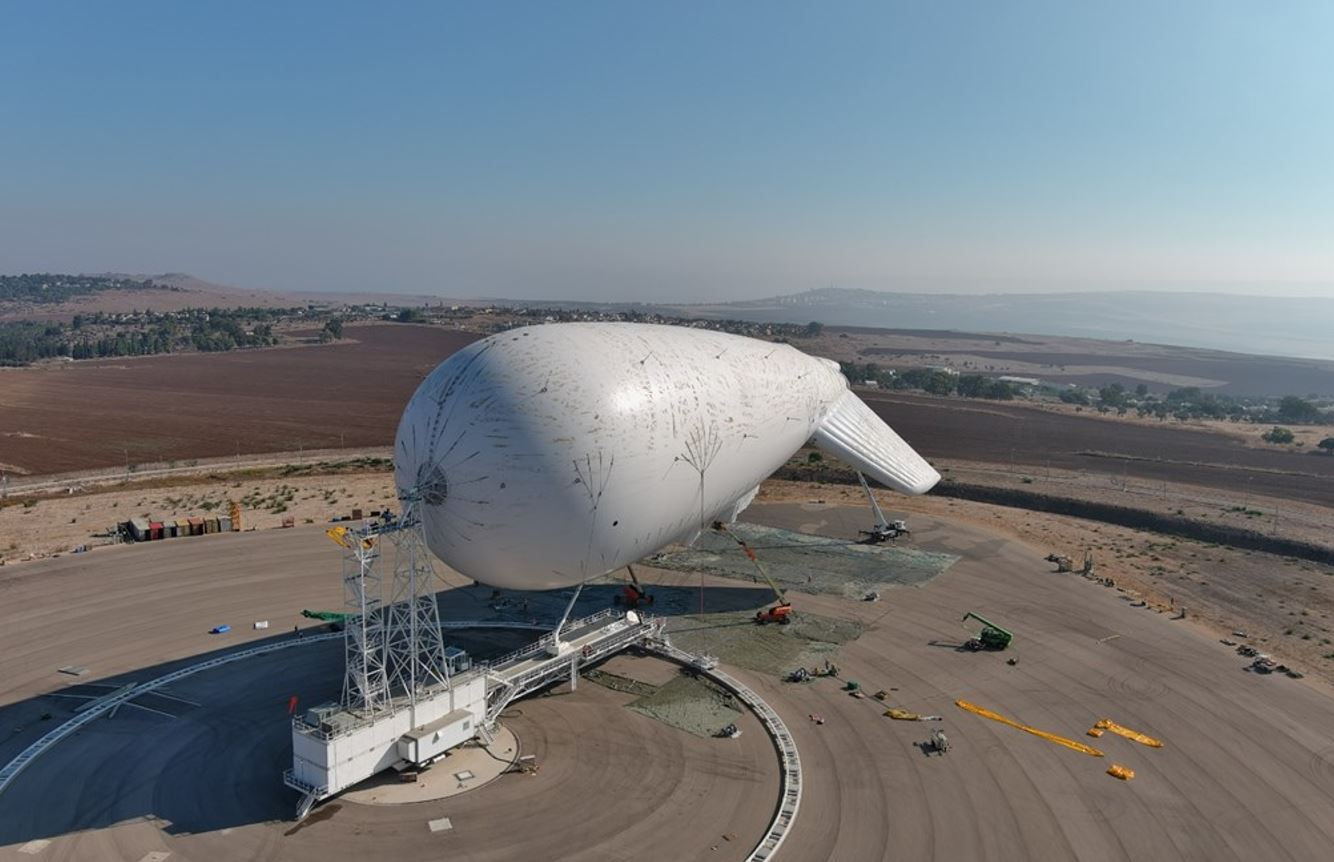
Some new aerial defense systems were revealed this past year. Tal Shamayim system
Photo: Ministry of Defense Spokesperson’s Unit
Over the past year Israel attempted somewhat to rectify the situation, in part by funding the implementation of some of the conclusions of the expert committee appointed by the TELEM Forum (National Infrastructure for Research and Development) as well as through Israel’s success in being admitted to the GPAI (Global Partnership on Artificial Intelligence), the exclusive association of countries in the field. However, at the outset of 2022 Israel clearly lacks a national strategy and central management of the field of artificial intelligence, except via the Ministry of Science and Technology, which does not have sufficient powers to lead the field nationally, as is the case in the United States, China, and elsewhere. In addition, Israel should increase its international involvement in shaping treaties and in setting standards in order to preserve its unique status in the field, which is necessary for maintaining its national security.
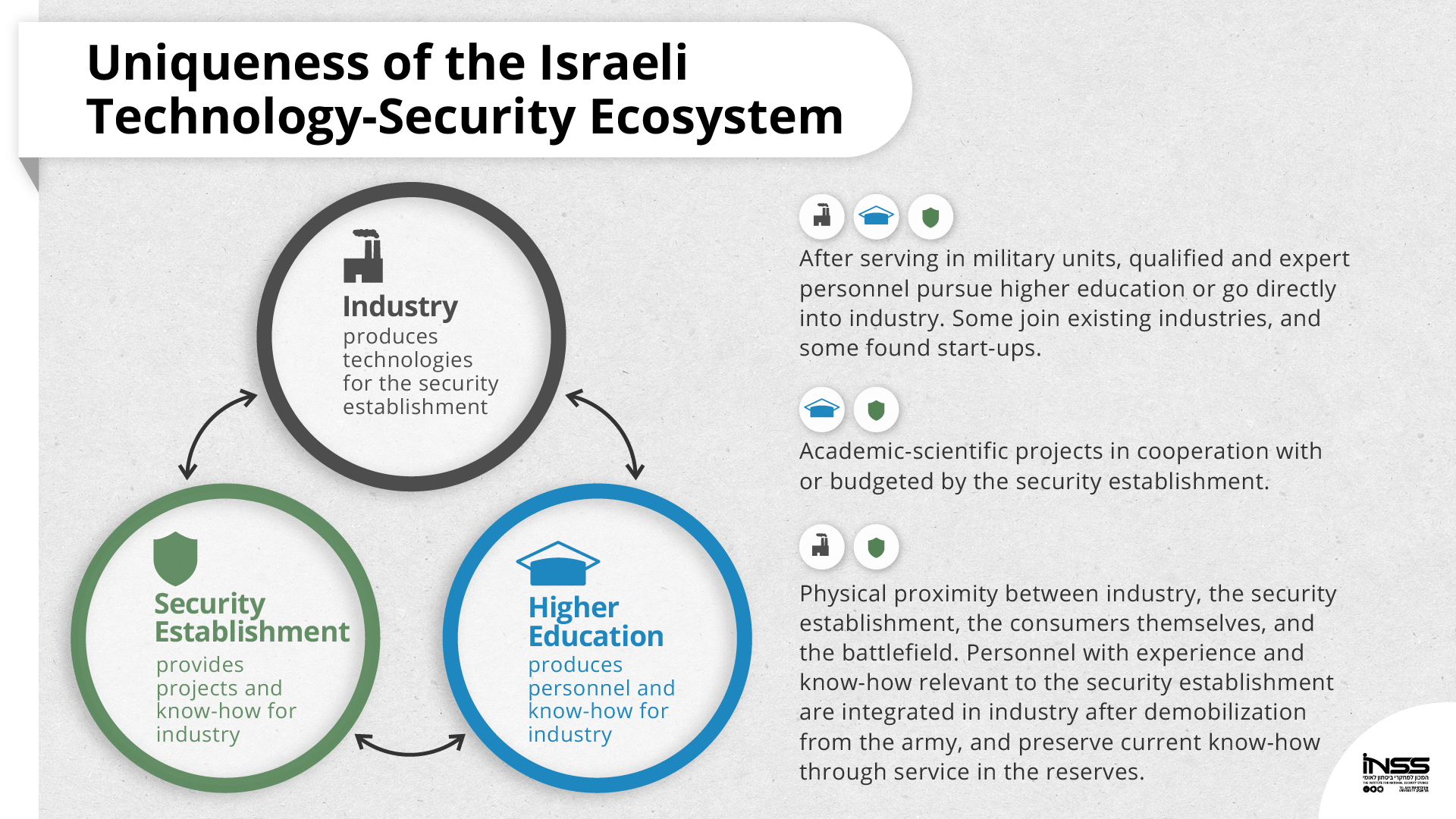
In conclusion, it is evident that Israel’s technological situation is relatively good, but it must improve its preparedness for coping with emerging challenges and changes, especially but not only in the aerial domain. In addition, a main part of the challenge in technology is related to national management of various issues. Positive change will help preserve and perhaps even enable improving national leadership in technological fields that are important to Israel, as well as setting and achieving its objectives for the coming decades.


